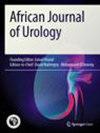Comparison of responses to neoadjuvant and adjuvant chemotherapies in muscle-invasive bladder cancer
IF 0.4
Q4 UROLOGY & NEPHROLOGY
引用次数: 0
Abstract
Bladder cancer surgery is critical for treatment, and systemic treatment before or after cystectomy may be necessary. We aimed to investigate the efficacy and response to neoadjuvant and adjuvant treatments. Data on 93 patients with resectable muscle-invasive bladder cancer were analyzed retrospectively. Patients who received neoadjuvant and adjuvant chemotherapies were included. The neoadjuvant treatment group was divided into pathological responders and non-responders. Overall survival and disease-free survival were calculated. The median age was 61.5 years; there were 6 female and 87 male patients. Baseline characteristics were similar between the groups. While there was no difference in OS between the neoadjuvant and adjuvant treatment groups (20 months vs. not reached), DFS was significantly higher in the adjuvant group (20.6 vs. 25.3 months). While there was no significant difference in DFS between the responders and non-responders to neoadjuvant treatment (20.6 vs. 19.1 months), OS was significantly longer in the responders (Not reached vs. 12.3 months). Our results concluded that neoadjuvant and adjuvant chemotherapies have similar survival rates, but no response was associated with poor outcomes. Determining the group for patient selection may be helpful for optimal management.肌肉浸润性膀胱癌新辅助与辅助化疗疗效比较
膀胱癌手术是治疗的关键,膀胱切除术前后的全身治疗可能是必要的。我们的目的是探讨新辅助治疗和辅助治疗的疗效和反应。回顾性分析93例可切除的肌肉浸润性膀胱癌患者的资料。包括接受新辅助和辅助化疗的患者。新辅助治疗组分为病理应答组和无应答组。计算总生存期和无病生存期。中位年龄为61.5岁;女性6例,男性87例。两组的基线特征相似。虽然新辅助治疗组和辅助治疗组之间的OS没有差异(20个月vs.未达到),但辅助治疗组的DFS明显更高(20.6 vs. 25.3个月)。虽然对新辅助治疗有反应者和无反应者的DFS没有显著差异(20.6个月对19.1个月),但有反应者的OS明显更长(未达到vs. 12.3个月)。我们的研究结果表明,新辅助化疗和辅助化疗具有相似的生存率,但没有反应与不良预后相关。确定患者选择组可能有助于最佳管理。
本文章由计算机程序翻译,如有差异,请以英文原文为准。
求助全文
约1分钟内获得全文
求助全文

 求助内容:
求助内容: 应助结果提醒方式:
应助结果提醒方式:


